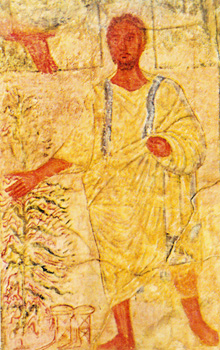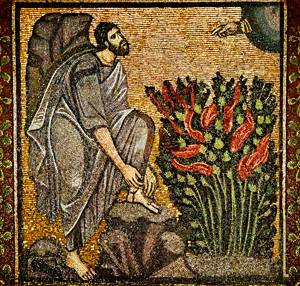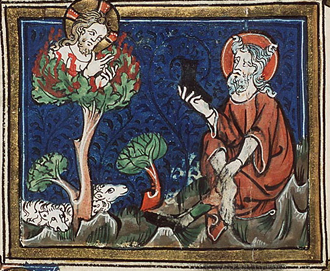The "Sweet Miracle of Our Empty Hands"
God Calls Moses and Jeremiah
For Sunday August 31, 2014
Lectionary Readings (Revised Common Lectionary, Year A)
Exodus 3:1–15 or Jeremiah 15:15–21
Psalm 105:1–6, 23–26, 45c or Psalm 26:1–8
Romans 12:9–21
Matthew 16:21–28
During a family vacation this summer, I re-read the novel Diary of a Country Priest (1936) by Georges Bernanos. The book won the Grand Prix du Roman, one of the oldest and most prestigious literary awards in France, and was made into an award-winning movie in 1951.
Bernanos tells the story of a young, unnamed priest who struggles with his sense of vocation. Despite his earnest efforts, and the encouragement of a trusted colleague, he feels like a failure. From a human perspective, he's not mistaken.
His small, rural parish is bored, boring, and petty. They gossip about him. He gets hate mail. His catechism class and sports club both falter. He gets embroiled in the bitter struggles of a wealthy family. He clashes with clergy bureaucrats over how to do his job.
 |
Moses and the Burning Bush, wall painting, Dura Europoa synagogue, c. 245 AD. |
Nonetheless, the priest perseveres. He loves his people. He visits every home every year. He prays for them.
His personal life is just as bad. He broods about the shame and pain of his peasant upbringing. He suffers from a chronic illness, an impoverished diet, and no money. He's self-conscious about his "superhuman clumsiness" and his social awkwardness. He has an "insuperable disgust" with his "absurd self."
He's powerless in the presence of suffering, and ponders the mystery of prayer. He's lonely and isolated. He sometimes feels like he's play-acting and parroting pious cliches.
Reflecting upon his "wretched weakness," he confides to his diary: "Oh, yes, I've worked hard enough! I've done my best, and what's the use? My best is nothing."
He's like "a hornet in a bottle," and so he keeps his diary — to keep himself honest, unburden himself to God, and record "the simple trivial secrets of a very ordinary kind of life."
His diary reflects his sense of futility about his call to ministry. "We pay a heavy, very heavy price for the super-human dignity of our calling. The ridiculous is always so near to the sublime. And the world, usually so indulgent to foibles, hates ours instinctively."
And so he frets: "Am I where our Lord would have me? Twenty times a day I ask this question."
The Old Testament readings this week describe how God called Moses and Jeremiah. They were unlikely candidates for improbable vocations.
Moses was the protagonist in Israel's exodus from Egypt. After surviving infanticide, he grew up in Pharaoh's household at the center of political power. As an adult, he murdered an Egyptian for beating a fellow Hebrew, which caused that same Pharaoh to try to murder him. So, he ran away.
But in the "far side of the desert" (Ex. 3:1), God called Moses to return to Egypt, the land of Israel's oppressors, to face down Pharaoh and liberate his people.
 |
Moses and the Burning Bush, Byzantine mosaic, c. 9th century. |
The exodus was a liberation from oppression and exploitation, a miraculous deliverance, one of God's mighty acts of power. It was a dramatic intervention to shatter the enemy, work wonders, and break the powers of bondage. The exodus reverberates throughout the Bible as a reminder of God's power to save. It is celebrated at Passover even today by Jews.
Jeremiah was a prophet during Israel's exile to Babylon. Whereas Moses confronted enemy Egypt, Jeremiah foretold Israel's destiny with disaster.
To the prophets, priests, and kings of his own nation, Jeremiah preached an unpatriotic, seditious, and judgmental message: "Stop feeding our people reckless lies and false hopes. Stop betraying them with your delusional messages of comfort. National disaster is upon us."
Exile meant deportation to pagan Babylon. For God's elect nation it was unthinkable, beyond comprehension. What had happened? Where were God's mighty acts of power? How could God abandon them to a pagan enemy?
But God was present in exile as well as in exodus: "'For I know the plans that I have for you,' declares the Lord, 'plans to prosper you and not to harm you, plans to give you hope and a future'" (Jer. 29:11).
Both Moses and Jeremiah responded to God's call with protests about their personal inadequacies. They experienced failure, opposition from detractors, and deep discouragements.
Moses is famous for his litany of fears — lack of confidence, limited skill, insecurities about personal identity, and fear of rejection (Exodus 3-4).
For his forty years of faithfulness to God's call, Jeremiah was beaten (20:2), received death threats (26:8), imprisoned (37:15), thrown down a well (38:6), and derided as an unpatriotic traitor. Almost no one listened to him. He was a man of "reproach" among his own people (15:15).
Anyone who has struggled to hear God's call can identify with Jeremiah and Moses. Their many struggles, real and imagined, remind us that there's no divine call without human conflict.
In Bernanos's novel, an older colleague affirms the young priest's vocation. He encourages him with wise advice: "Keep saying your lessons. Go on with your work. Keep at the little daily things that need doing, til the rest comes. Concentrate. Think of a lad at his homework, trying so hard and his tongue sticking out. That's how our Lord would have us be when he gives us up to our own strength. Little things — they don't look like much, yet they bring peace. Like wild flowers which seem to have no scent, till you get a field full of 'em."
"Keep marching to the end," he tells the discouraged priest, "and try to end up quietly at the roadside without shedding your equipment."
And that's what the young priest did. In one turn of events, he's shocked to see how God clearly used him in the life of a parishioner. "Oh, miracle, thus to be able to give what we ourselves do not possess, sweet miracle of our empty hands."
 |
Moses and the Burning Bush, Michiel van der Borch, Koninklijke Bibliotheek, The Hague, 1332. |
In the end, the priest makes peace with God's call on his life. "Well, it's all over now. The strange mistrust I had of myself, of my own being, has flown. I believe forever. That conflict is done. I cannot understand it anymore. I am reconciled to myself, to the poor, poor shell of me. How easy it is to hate oneself! True grace is to forget. Yet if pride could die in us, the supreme grace would be to love oneself in all simplicity."
I wish I had read Bernanos's novel in seminary, although I was probably too young then to have understood its message. The Diary of a Country Priest is the sort of book to savor when you're at least fifty. By that time, if you're lucky, your human struggles with the divine call have carved lines into your face and deep channels in your heart.
Moses, Jeremiah, and the young priest persevered in their calls. Every divine vocation requires human perseverance.
But God gives us more than an exhortation to perseverance. He promises his presence. When Moses doubted his deepest self ("Who am I?"), God assured him, "I will be with you" (Exodus 3:12). To Jeremiah he promised the exact same thing: "Do not be afraid, for I am with you" (Jeremiah 1:8, 15:22).
And so on his deathbed the young priest confessed, and so should we, "Grace is everywhere."
For further reflection:* Contemplate Paul's own sense of inadequacies in 2 Corinthians 4:7–12.
* In the novel Gilead, the narrator-pastor John Ames ponders a lifetime of wrestling with God's call. He reflects upon his life experiences and how they have woven a rich tapestry whose beautiful texture could only result from many different strands — frailty and failure, memory and mystery, darkness and disappointment, regret and reconciliation, and, weaving it all together, sheer gratitude and joy at how remarkably beautiful the resulting garment of his life still is. Near the end of his life, Ames writes to his son: "I always imagine divine mercy giving us back to ourselves and letting us laugh at what we became, laugh at the preposterous disguises of crouch and squint and limp and lour we all do put on. I enjoy the hope that when we meet [in heaven] I will not be estranged from you by all the oddnesses life has carved into me."
Image credits: (1) Textweek.com; (2) Iconreader.wordpress.com; and (3) Blogspot.com.





